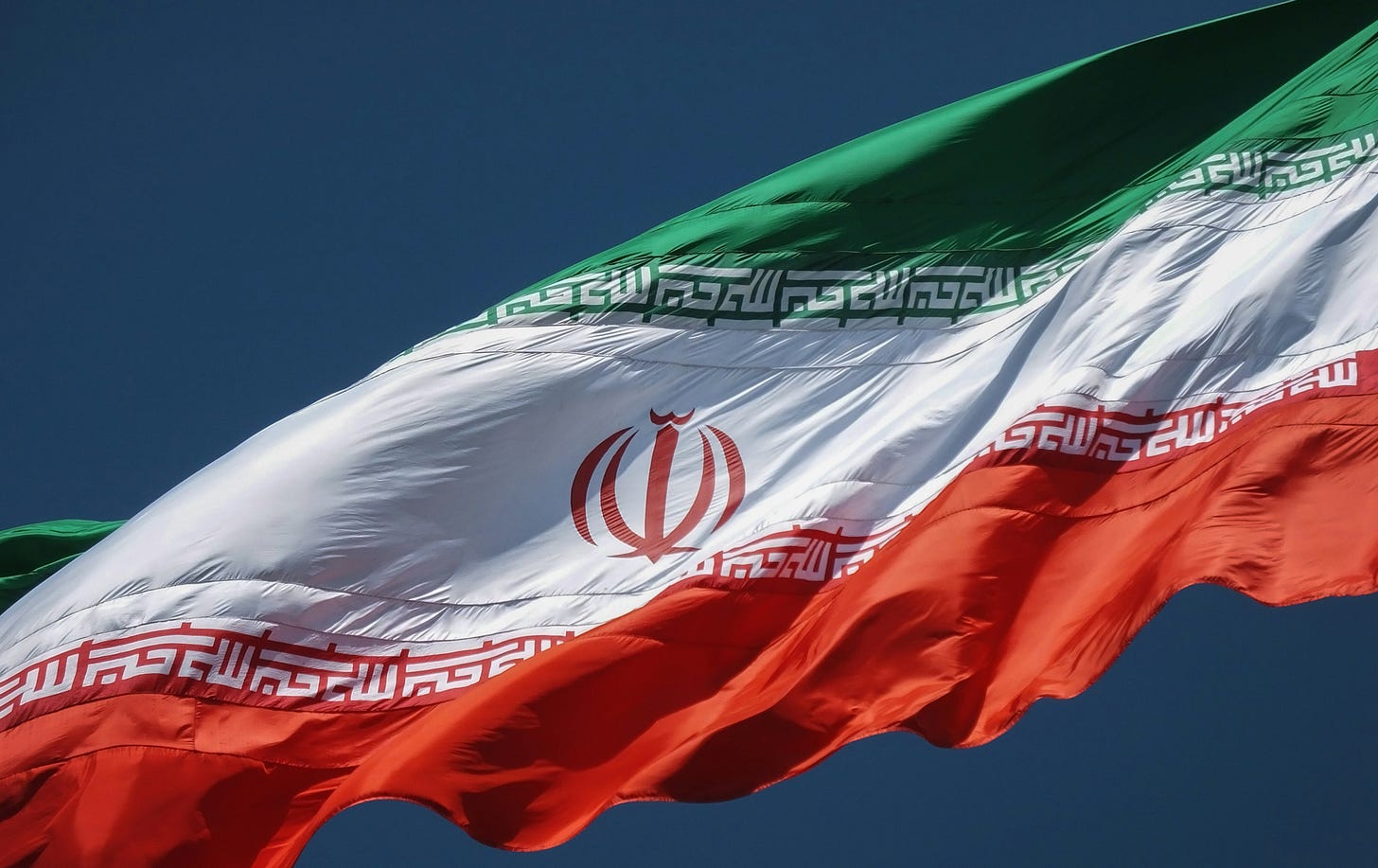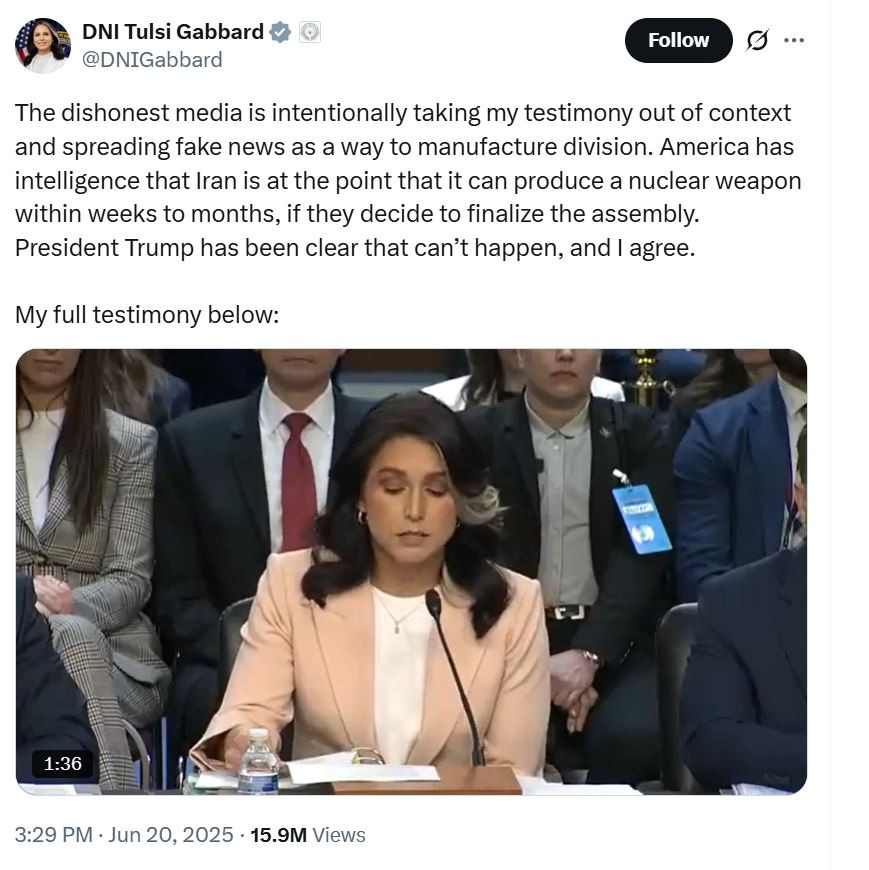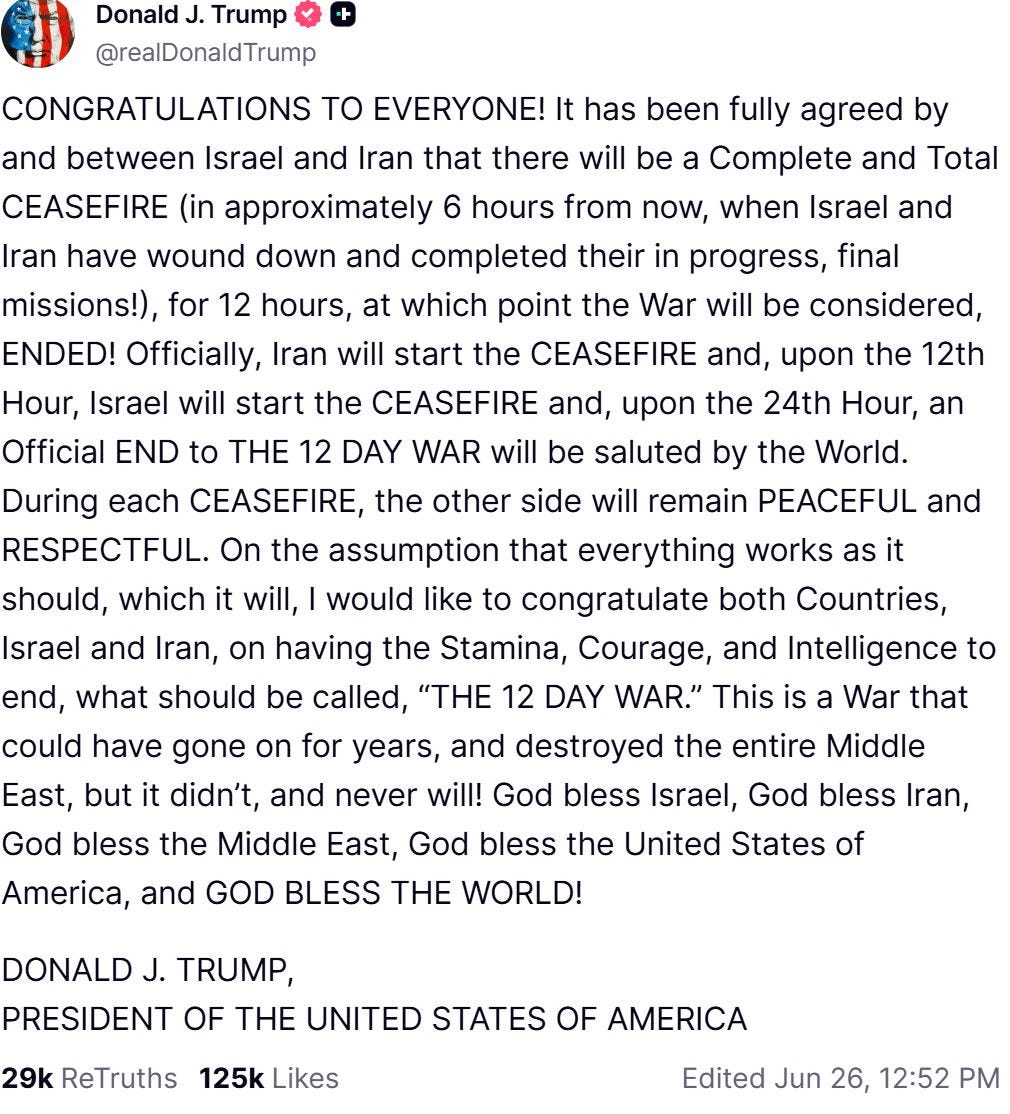The 12 Day War
Trump engaged in an incredibly dangerous and escalatory strike on Iran that could’ve led to a much worse situation than it did.

Over the last year and eight months, the Middle East has been embroiled in conflict as the Israeli government has been conducting a genocidal war and ethnic cleansing campaign in Gaza, expanding its illegal settlements in the West Bank, occupying parts of Lebanon and Syria, bombing Yemen, and has also engaged in several provocative escalations toward Iran — which eventually led to Israel and Iran launching drones and missiles at each other last year.
As I wrote last June:
Back in April [2024] it was reported that Israel conducted an airstrike on an Iranian consulate building in Syria, which killed several Iranian military advisors. This blatant war crime sparked concerns that a war between Israel and Iran was imminent — and should that ever happen, it is very likely that the US would become directly involved.
Iran responded a couple of weeks later by attacking Israel with a barrage of drones and missiles…
Days later, Israel responded by launching its own attack on Iran, and Iranian media reported that Iran’s air defenses had intercepted three “micro air vehicles”. This fortunately seemed to be the end of the back-and-forth between Israel and Iran, but for those few weeks a war between the two countries seemed all too likely — and the possibility of one eventually taking place still exists.
It appears that war finally arrived, as Israel started bombing Iran on Friday, June 13, which prompted Iran to quickly begin engaging in retaliatory strikes on Israel. In the days following Israel’s attack, many speculated that the US would eventually become directly involved — a prediction that proved correct, as the Trump administration bombed three Iranian nuclear facilities on Saturday, June 21.
Iran responded by attacking a US military base in Qatar, which sparked concerns that things would escalate drastically. Fortunately, within hours of Iran’s attack Trump announced that Israel and Iran had agreed to a ceasefire. After a rough start, that ceasefire appears to be holding, but the future of this conflict remains uncertain.
Failed Negotiations and Inconvenient Intelligence
Israel’s initial attack on Iran came amid negotiations between the US and Iran which were intended to limit Iran’s nuclear program and prevent Iran from attaining nuclear weapons while also providing Iran with relief from US sanctions. Those talks were failing to make much progress, largely due to the fact that the US was demanding that Iran cease enriching uranium entirely, a process that is needed for nuclear energy as well as nuclear weapons. The negotiations were brought to an end by Israel’s attack on Iran, which occurred just a couple of days before another round of talks were set to take place on Sunday, June 15.
A similar deal, known as the Joint Comprehensive Plan of Action (JCPOA) was struck between the US and Iran during the Obama administration; the deal also included China, Russia, France, the UK, and Germany. The US withdrew from the JCPOA during Trump’s first term as president, and had Trump remained in the deal the recent negotiations would’ve been completely unnecessary.
While for years it has been claimed by hawks within the US and Israel that Iran is “weeks away” from building a nuclear weapon, the consensus from the US intelligence community (IC) has long been that Iran is not pursuing nuclear weapons and it would take years for Iran to build one even if it were, as CNN recently reported. That consensus was also reiterated back in March by Director of National Intelligence Tulsi Gabbard during a testimony she gave to the Senate Intelligence Committee.
In two separate instances after Israel’s attack on Iran, Trump was asked about Gabbard’s testimony, and both times he rejected the assessment of his director of national intelligence. In one instance Trump responded to reporters by saying “I don’t care what she said,” and in the other instance Trump bluntly stated “She’s wrong.”
To her shame, Gabbard responded to Trump’s remarks by attempting to spin her testimony from March to more closely align with the administration’s recent agenda. In a post on X, Gabbard said that “The dishonest media is intentionally taking my testimony out of context and spreading fake news as a way to manufacture division. America has intelligence that Iran is at the point that it can produce a nuclear weapon within weeks to months, if they decide to finalize the assembly. President Trump has been clear that can’t happen, and I agree.”
This is counter to the position Gabbard has held on this issue since long before she became DNI, and her recent about-face is a clear example of how even people with seemingly good intentions can become corrupted once they attain the levers of power.
US Involvement in Israel’s Attack
In the wake of Israel’s attack on Iran, US officials initially denied any involvement. One such example is a statement from Secretary of State Marco Rubio in which he said that “Israel took unilateral action,” and that the US was “not involved in strikes against Iran”. However, within days Trump was making public statements that appeared to suggest that the US had actually been involved the whole time.
“We now have complete and total control of the skies over Iran,” Trump said in a post on Truth Social. “Iran had good sky trackers and other defensive equipment, and plenty of it, but it doesn’t compare to American made, conceived, and manufactured ‘stuff.’ Nobody does it better than the good ol’ USA.”
It’s well known that the US supplies Israel with massive amounts of American made weapons, but Trump’s post didn’t mention Israel at all. Instead it seemed to imply that it was the US that had been attacking Iran. This may have just been Trump’s typical bluster, but it at least highlighted one aspect of US involvement; namely, that the arms Israel was using in its war on Iran were made and supplied by the US. It was even reported by Middle East Eye recently that the US shipped hundreds of Hellfire missiles to Israel just days before the war on Iran began.
Another example of the Trump administration’s involvement in Israel’s war was the fact that the US helped intercept Iranian missiles that were launched toward Israel in retaliation for its initial attack.
Recent reports also suggest that the US may have been deeply involved in Israel’s plans to strike Iran from the very beginning, and that the negotiations between the US and Iran were meant to lull the Iranian government into a false sense of security.
As reported by Axios:
Two Israeli officials claimed to Axios that Trump and his aides were only pretending to oppose an Israeli attack in public — and didn't express opposition in private. "We had a clear U.S. green light," one claimed.
The goal, they say, was to convince Iran that no attack was imminent and make sure Iranians on Israel's target list wouldn't move to new locations.
Netanyahu's aides even briefed Israeli reporters that Trump had tried to put the brakes on an Israeli strike in a call on Monday, when in reality the call dealt with coordination ahead of the attack, Israeli officials now say.
These allegations have not been confirmed by the Trump administration, but it wouldn’t be the least bit surprising if they were eventually proven true. And if in fact they are, then that leaves Iran with very little incentive to engage in further talks with the US. After Trump’s unilateral withdrawal from the JCPOA and now his alleged bad-faith negotiations, why would Iranian officials have any reason to trust the US in the future?
Trump Bombs Iran
In the days following the start of Israel’s war on Iran, the Israeli government began urging the Trump administration to become directly involved, and specifically called for the US to drop “bunker buster” bombs on Iran’s Fordow uranium enrichment plant.
For a short period of time it was unclear if the Trump administration was willing to join the war on behalf of Israel, but it was widely reported that Trump was at least considering that option. On Thursday, June 19, White House spokesperson Karoline Leavitt told reporters that Trump would make a decision on becoming directly involved in Israel’s war “within the next two weeks”. Just two days later, the US did exactly what Israel had been calling for and bombed three Iranian nuclear facilities.
By bombing Iran without congressional approval, Trump simultaneously violated the US Constitution — which clearly states that Congress, not the president, has the authority to declare wars — and broke his campaign promise to not start any new wars. And why did Trump betray the Constitution and his voters? For the sake of the foreign country of Israel.
After the US bombed Iran, Trump gave an address to the nation about the attack. In that address, Trump claimed that “the strikes were a spectacular military success” and that “Iran’s key nuclear enrichment facilities have been completely and totally obliterated.” He then called on Iran to make peace, and threatened “far greater” future attacks should Iran fail to comply with his demands.
While Trump and his administration continue to claim that Iran’s nuclear program has been destroyed — or at least significantly set back — statements from Iranian, Israeli, and US officials, as well as the International Atomic Energy Agency (IAEA), all suggest that the sites the US hit had been evacuated and emptied of enriched uranium before they were hit.
As Antiwar’s Dave Decamp recently wrote:
Israeli officials and a senior American official have told The New York Times that the US bombing of Iran’s underground Fordow nuclear site didn’t destroy the facility despite President Trump’s pronouncement that the attack “completely and totally obliterated” the nuclear facilities that were targeted.
Two Israeli officials told the paper that the Israeli military’s initial assessment, which is based mainly on satellite images, was that the strikes seriously damaged Fordow but didn’t completely destroy it. They said it appeared that Iran had evacuated the facility and removed enriched uranium, which aligns with a statement from Tehran.
…
Iran said that it also evacuated the sites at Natanz and Isfahan and removed nuclear material. The International Atomic Energy Agency (IAEA) said that it did not detect any radiation in the area following the US attacks. “Following attacks on three nuclear sites in Iran… the IAEA can confirm that no increase in off-site radiation levels has been reported as of this time,” the IAEA said.
If this is true, then Trump risked the lives of US service members stationed in the region and potentially started a new war that could’ve lasted for years and cost the US untold amounts of blood and treasure just to not even accomplished his stated goals.
Iran’s Response
Before the US ever directly entered Israel’s war on Iran, the Iranian government had warned that they would target US bases in the region — of which there are many — if the US became involved. Sure enough, after the Trump administration bombed three of Iran’s nuclear facilities, Iran responded by attacking the US’s Al Udeid base in Qatar on Monday, June 23.
Fortunately, Iran gave Qatar advanced notice of the attack, which allowed time for the US to evacuate the base and effectively intercept Iran’s missiles. This appears to have been a very calculated move on Iran’s part. By responding in this way, the Iranian government showed the world that they are capable of reaching out and touching US assets in the region and showed the domestic Iranian population that any nation that attacks Iran will face retaliation. However, this attack was done in such a way that no Americans or Qataris were killed, which provided an opportunity to end the conflict between the US and Iran without further escalation.
There was no guarantee that this is how Iran would respond, however. Had Iran not given advanced notice and attacked multiple US bases at once, American lives would almost surely have been lost, and this war would have likely escalated much further. Iran also backs several militias in Iraq and Syria, as well as the Houthis in Yemen, and if all of those groups had coordinated attacks on US bases this whole situation could’ve turned out much bloodier than it ended up being.
Crisis Averted, For Now
Within hours of Iran’s attack on a US base in Qatar, Trump announced that both Israel and Iran had agreed to a ceasefire. In a post on Truth Social, Trump laid out the parameters of a ceasefire and referred to the recent conflict as “THE 12 DAY WAR”.
“CONGRATULATIONS TO EVERYONE! It has been fully agreed by and between Israel and Iran that there will be a Complete and Total CEASEFIRE,” Trump said. “On the assumption that everything works as it should, which it will, I would like to congratulate both Countries, Israel and Iran, on having the Stamina, Courage, and Intelligence to end, what should be called, ‘THE 12 DAY WAR.’ This is a War that could have gone on for years, and destroyed the entire Middle East, but it didn’t, and never will! God bless Israel, God bless Iran, God bless the Middle East, God bless the United States of America, and GOD BLESS THE WORLD!”
Initially, it seemed unclear whether this was true or not, as the fighting continued beyond the timeframe that Trump had announced. This seemed to anger Trump, who told reporters outside of the White House that both countries “don’t know what the fuck they’re doing.”
When asked about Iran’s violation of the ceasefire, Trump responded by saying “They [Iran] violated it, but Israel violated it too. Israel, as soon as we made the deal, they came out and they dropped a load of bombs the likes of which I’ve never seen before. The biggest load that we’ve seen. I’m not happy with Israel. When I say, ‘OK, now you have 12 hours,’ you don’t go out in the first hour and just drop everything you have on them. So, I’m not happy with them, I’m not happy with Iran either.”
The ceasefire eventually seemed to stick, and as of now it appears to be holding, but this entire situation could’ve been avoided entirely had Trump not joined the war in the first place and had actually engaged in good faith negotiations with Iran.
In the wake of the ceasefire, many conservative and right-wing influencers and commentators have been praising Trump as if he brokered some amazing peace agreement. In reality, Trump engaged in an incredibly dangerous and escalatory strike on Iran that could’ve led to a much worse situation than it did. Instead of preventing a major war, Trump nearly caused one. While a ceasefire between Israel and Iran is about the best outcome we could’ve hoped for, it wasn’t guaranteed to happen, and if it hadn’t, Trump would’ve been responsible for whatever worse outcomes might have taken place.
Thanks for reading! If you enjoy my writing, feel free to subscribe to my Substack, or you can follow me on Twitter, Minds, or MeWe.




